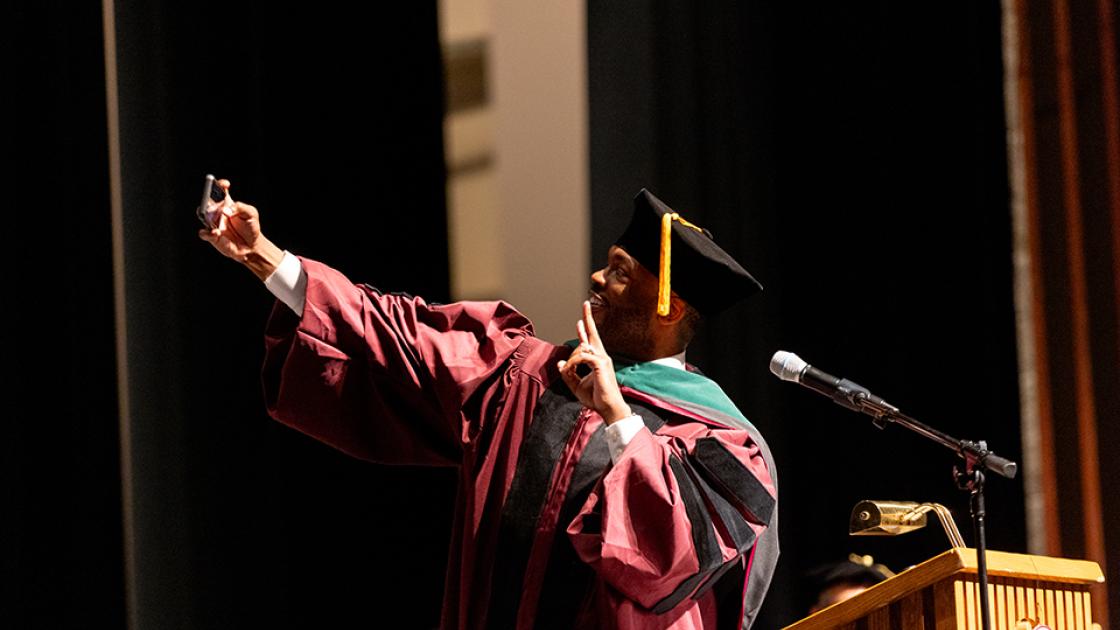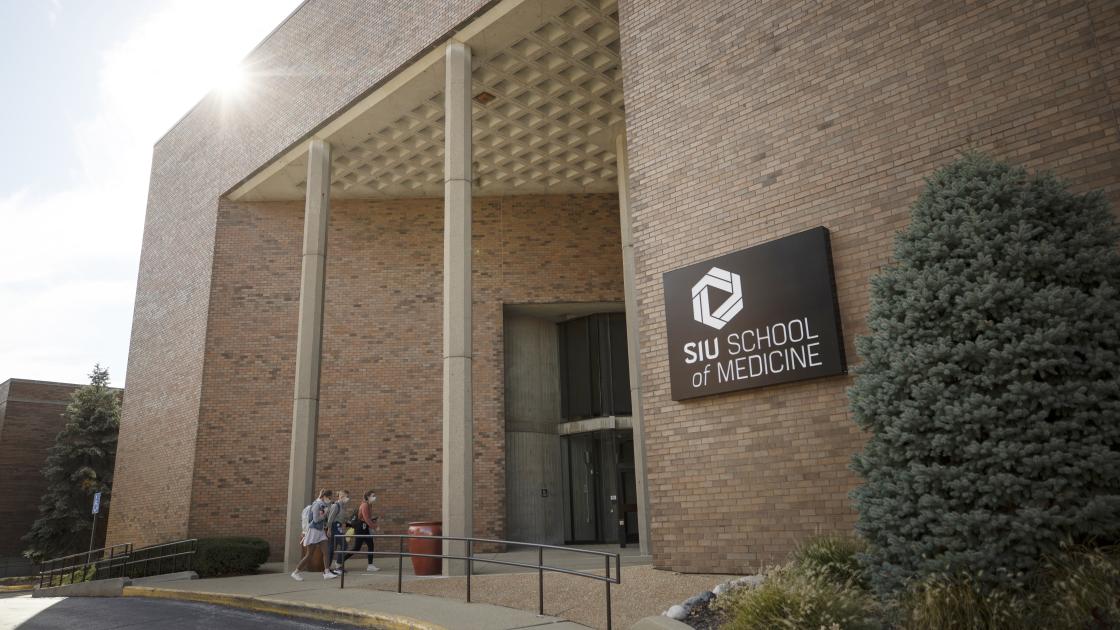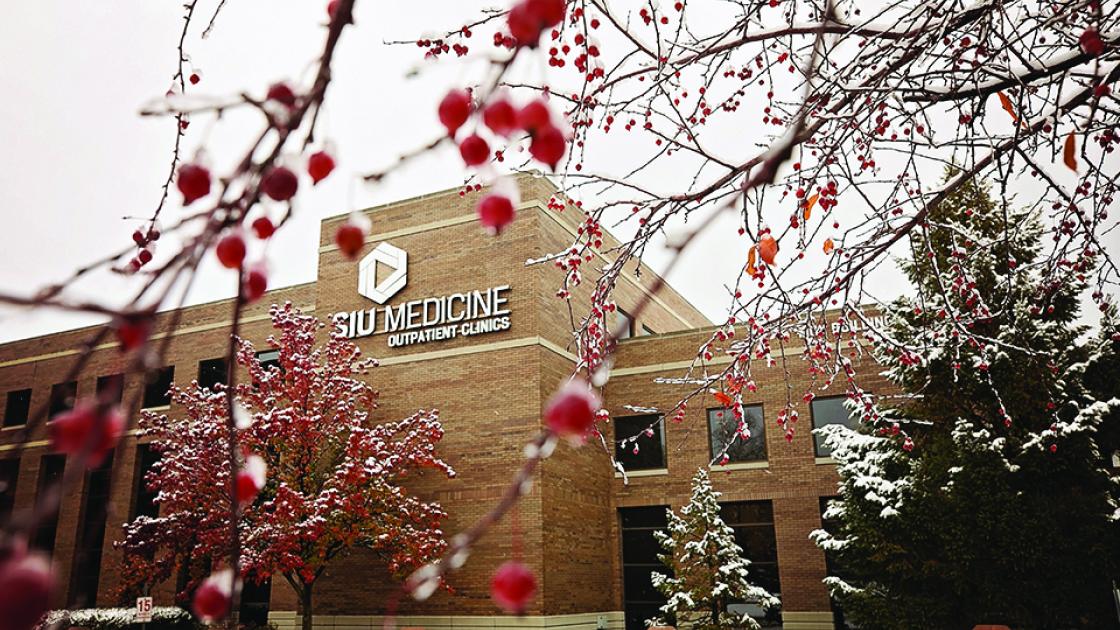
'The most powerful medicine is sometimes invisible.'
Dr. Kevin Simon is a psychiatrist and the inaugural chief behavioral health officer for the city of Boston. He is also a graduate of SIU School of Medicine (Class of 2015) and of SIU’s MEDPREP. He was profiled in the spring 2024 Aspects.
His commencement address 'The Anatomy of Time & Presence' was delivered at the 51st Annual Convocation for Southern Illinois University School of Medicine on May 17, 2025.
__
Faculty and staff, thank you for your guidance and stewardship in helping guide these future healers. To the proud families, friends, loved ones, brothers, sisters, husbands and wives—thank you for everything you’ve done to help this class reach this point.
And to you, the SIU School of Medicine Class of 2025—today belongs to you. And I should know—I think there are eight of you Lincoln Scholars, if you’re counting.
For those who are not aware, the Lincoln Scholars Program—now graduating its second cohort—has chosen a distinct path in ownership and service to real communities. They completed their first two years in Carbondale. That may sound like a disadvantage, but if I had the chance, I would’ve done it—because let’s be honest, you got to eat at Quattro’s for four years!
Making it through medical school is no small feat. It requires grit, stamina, and—let’s not forget—the sheer endurance to sit through countless lectures on the coagulation cascade without throwing your computer against the wall. It’s a very difficult cascade.
You survived clinical rotations. You are part of the classes that learned medicine during a pandemic. You honed your skills. You demonstrated resilience. You learned to smile through an N95, answer pages in your sleep, and function in systems that sometimes stretched you.
And yet, all the clinical knowledge and technical skills you’ve gained—there are lessons no exam will ever test you on. Lessons that show up when you least expect them, sometimes in the quietest rooms.
Let me share one of those lessons from my own journey.
A 15-year-old boy—we’ll call him L—had just been transferred to the inpatient psychiatry unit from the ICU after a serious suicide attempt. When I entered the room, he didn’t look up. He crouched in a chair, hoodie on, drawstring removed. His walls were up.
We had a treatment plan. I didn’t start with medication. Instead, I asked if I could say something. I said, “I don’t know everything you’ve been through, but I want to understand what it’s like to be you today.”
He didn’t speak. Minutes passed.
Eventually, he muttered, “You know you can leave."
I said, "But you didn’t ask me to.”
So I stayed. I listened to the silence—because sometimes, silence is screaming. And slowly, over time, he began to share his story.
That moment didn’t require expertise. It required presence.
What I’ve come to understand is that the most powerful medicine is sometimes invisible. It’s made of attention. Stillness. Dignity.
It’s in the way we sit, how we listen, how we create space for others to be seen.
Your faculty have trained you well—to read EKGs, interpret labs, build differentials. But the next part of your journey is learning to read the room. Interpret a glance. Feel when someone is close to telling you something that matters.
This is deep work. And to do it well, you must hold onto something artists call “The Beginner’s Mind.”
Beginner’s mind is not easy. It means letting go of what you think you already know. It means making decisions not from fixed beliefs, but from the freshness of what is being presented to you in real time.
Beginner’s mind is not ignorance. It’s openness.
So don’t fear not knowing. Let it sharpen your senses, but soften your assumptions. There is great power in starting from a place of curiosity. Because the most healing questions you’ll ever ask won’t come from certainty—but from wonder.
We talk about time. Supposedly, we never have enough of it.
But here’s the truth: time and presence are twins. And presence doesn’t require a lot of time. It requires that we pay attention to the time we do have.
I’ve learned that one minute—just 60 seconds—can change everything for a patient. I’ve seen it happen in the hallway, in the exam room, over a phone call.
There’s something sacred in how we approach moments, even brief ones. The anatomy of time is strange. Some minutes dissolve before we even notice them. Others arrive so full they seem to hum, to expand inside us like a breath we didn’t know we were holding.
Time is not about length. It’s about meaning.
And the most meaningful moments are the ones you don’t rush through. They’re the ones you allow to open.
There is always time to do the right thing.
You will be busy. But remember—being present doesn’t demand more minutes. It demands more intention. The people you serve won’t remember how long you were with them. They’ll remember how you made those minutes feel.
You are stepping into a profession of extraordinary responsibility and privilege. You will be invited into rooms where grief lingers and hope flickers. You will deliver life-changing news:
“You’re having twins.”
“It’s cancer.”
“The surgery was successful.”
“I’m sorry for your loss.”
You will be asked to navigate uncertainty. To hold hands that feel impossibly small inside yours. To lead with courage and care.
So I ask you: What kind of doctor will you be?
Will you rush through the physical exam, or will you pause to ask, “Is there anything else on your mind?”
Will you let medicine harden you—or will you let it shape you?
Because you will be changed. There will be losses that stay with you. There will be nights when the weight of this work feels like too much. There will be moments when science cannot save someone you’ve grown to care about.
And still—you’ll return. You’ll show up. Because that’s what we do.
You’ve spent more than four years learning medicine. Now you’ll spend the rest of your life learning people.
Let them challenge your assumptions. Let them show you what strength looks like.
This is not easy work. But if you protect your empathy, your curiosity, your joy—medicine will not just be what you do. It will be who you become.
Today, having crossed this stage, you join a long line of healers. Some wear white coats. Others wear scrubs or weary faces, holding communities together through sheer faith.
But all of them know this: healing is not a transaction. It’s a relationship. A sacred promise to walk alongside others in their hardest moments.
Now you carry that promise—with your training, your heart and your hands. Let them be steady. Let your mind stay curious. Let your spirit never forget what it means to care.
Today marks not just a milestone—but the beginning of a life.
Because somewhere, right now—literally right now—there’s a child wondering if they’ll get care. Wondering if they'll be safe. And you might be the first doctor to make them feel that way.
When you're tired—and you will be tired—you keep showing up.
When you’re unsure—you keep showing up.
When you feel like you don’t belong—you keep showing up.
Because our world doesn’t just need more doctors. It needs you.
With every exam room you enter, every bedside you approach, every community you’re called to serve—bring your skill, your heart, your courage, your presence.
You’re not just entering medicine. You’re stepping into sacred work.
Work that heals bodies—and the spaces between us.
Class of 2025, you are the ones we’ve been waiting for.
Congratulations—and thank you for this time.



